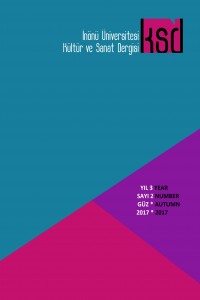Abstract
Stoacılık,
Helenistik ve Roma felsefesinde Epikurosçuluk ve Septiklerle birlikte üçüncü
önemli okulun adıdır. Kıbrıslı Zenon tarafından kurulan okul, kurumsal bir
‘okul’ olmamasına rağmen yaklaşık olarak 500 yıl gibi uzun bir süre varlığını
sürdürmüştür. Marcus Tullius Cicero, Seneca, Epiktetos ve Marcus Aurelius bu
dönem Stoa filozoflarıdır. Bu çalışmada, özelde Geç Dönem Stoa felsefesinin
etik anlayışının yaşam sanatı bağlamında ele alınmış olmasının yanı sıra,
Stoacılığın genel öğretileri ve ilk kurucularının düşüncelerine de yer
verilmiştir. Geç Dönem Stoa felsefesinin merkezinde yer alan etik anlayışı bu
dönemde yaşam sanatının vazgeçilmez bir unsuru olarak değerlendirilmiştir.
Tanrı, Tanrısal akıl, doğa ve insanın panteist anlayış çerçevesinde bir bütün
olarak algılanmasının yanı sıra dönemin filozoflarınca sistematik bir öğreti
üretilmiştir. Sonuç olarak, erdeme odaklanan bu etik anlayışı mutluluğa erişme
hedefindeki insan için yol gösterici olmuş ve yaşam sanatının icrasında bir
temel olarak algılanmıştır.
Keywords
References
- Arslan, A. (2012). Felsefeye Giriş. Ankara: Liberte Yayınları.
- Arslan, A. (2012). İLKÇAĞ FELSEFE TARİHİ 4: Helenistik Dönem Felsefesi: Epikurosçular Stoacılar Septikler. İstanbul: İstanbul Bilgi Üniversitesi Yayınları . Aurelius, M. (2011). Meditations: With Selected Correspondence. (R. Hard, Çev.) New York: Oxford University Press.
- Becker, L. C. (2003). Human Health and Stoic Moral Norms. Journal of MEdicine and Philosophy, 28(2), 221-238.
- Cevizci, A. (2012). İlkçağ Felsefesi Tarihi. Bursa: Asa Yayıncılık.
- Cicero. (2013). Yükümlülükler Üzerine. (C. C. Çevik, Çev.) İstanbul: Türkiye İş Bankası Kültür Yayınları.
- Epictetus. (2014). Discourses, Fragments, Handbook. (R. Hard, Çev.) Oxford: Oxford University Press.
- Frede, M. (2004). On the Stoic Conception of the Good. K. Ierodiakonou içinde, Topics in Stoic Philosophy. New York: Oxford University Press.
- Gill, C. (2003). The School in the Roman Imperial Period. B. Inwood içinde, The Cambridge Companion to the Stoics. Cambridge University Press.
- Holowchak, M. A. (2009). Aducation as Training for Life: Stoic Teachers as Physicians of the Soul. Educational Philosophy and Theory, 41(2), 166-184.
- Kenny, A. (2006). An Illustrated Brief History of Western Philosophy. Blackwell Publishing. Laertius, Dİogenes. Lives of the Eminent Philosophers.
- Reydams-Schils, G. (2010, October). Philosophy and Education in Stoicisim of the Roman Empire. Oxford Review of Education, 36(5), 561-574.
- Russell, B. (2004). History of Western Philosophy. London: Routledge Classics.
- Seneca. (2008). Dialogues and Essays. (J. Davie, Çev.) Oxford: Oxford University Press.
- Sharples, R. W. (2003). Stoics, Epicureans and Sceptics: An Introduction to Hellenistic Philosophy. Routledge Publishing.
- Skirbekk, G., & Gilje, N. (2004). Antik Yunan'dan Modern Döneme Felsefe Tarihi. (E. Akbaş, & Mutlu Şule, Çev.) İstanbul: Üniversite Kitabevi Yayınları.
- Weber, A. (1998). Felsefe Tarihi. (H. V. Eralp, Çev.) İstanbul: Sosyal Yayınları.
Abstract
References
- Arslan, A. (2012). Felsefeye Giriş. Ankara: Liberte Yayınları.
- Arslan, A. (2012). İLKÇAĞ FELSEFE TARİHİ 4: Helenistik Dönem Felsefesi: Epikurosçular Stoacılar Septikler. İstanbul: İstanbul Bilgi Üniversitesi Yayınları . Aurelius, M. (2011). Meditations: With Selected Correspondence. (R. Hard, Çev.) New York: Oxford University Press.
- Becker, L. C. (2003). Human Health and Stoic Moral Norms. Journal of MEdicine and Philosophy, 28(2), 221-238.
- Cevizci, A. (2012). İlkçağ Felsefesi Tarihi. Bursa: Asa Yayıncılık.
- Cicero. (2013). Yükümlülükler Üzerine. (C. C. Çevik, Çev.) İstanbul: Türkiye İş Bankası Kültür Yayınları.
- Epictetus. (2014). Discourses, Fragments, Handbook. (R. Hard, Çev.) Oxford: Oxford University Press.
- Frede, M. (2004). On the Stoic Conception of the Good. K. Ierodiakonou içinde, Topics in Stoic Philosophy. New York: Oxford University Press.
- Gill, C. (2003). The School in the Roman Imperial Period. B. Inwood içinde, The Cambridge Companion to the Stoics. Cambridge University Press.
- Holowchak, M. A. (2009). Aducation as Training for Life: Stoic Teachers as Physicians of the Soul. Educational Philosophy and Theory, 41(2), 166-184.
- Kenny, A. (2006). An Illustrated Brief History of Western Philosophy. Blackwell Publishing. Laertius, Dİogenes. Lives of the Eminent Philosophers.
- Reydams-Schils, G. (2010, October). Philosophy and Education in Stoicisim of the Roman Empire. Oxford Review of Education, 36(5), 561-574.
- Russell, B. (2004). History of Western Philosophy. London: Routledge Classics.
- Seneca. (2008). Dialogues and Essays. (J. Davie, Çev.) Oxford: Oxford University Press.
- Sharples, R. W. (2003). Stoics, Epicureans and Sceptics: An Introduction to Hellenistic Philosophy. Routledge Publishing.
- Skirbekk, G., & Gilje, N. (2004). Antik Yunan'dan Modern Döneme Felsefe Tarihi. (E. Akbaş, & Mutlu Şule, Çev.) İstanbul: Üniversite Kitabevi Yayınları.
- Weber, A. (1998). Felsefe Tarihi. (H. V. Eralp, Çev.) İstanbul: Sosyal Yayınları.
Details
| Journal Section | Derleme |
|---|---|
| Authors | |
| Publication Date | December 25, 2017 |
| Published in Issue | Year 2017 Volume: 3 Issue: 2 |


